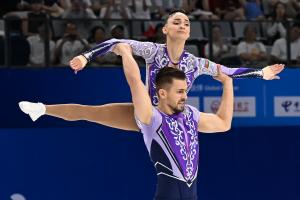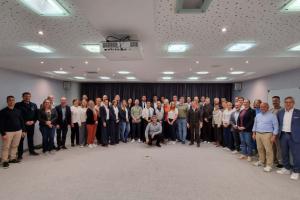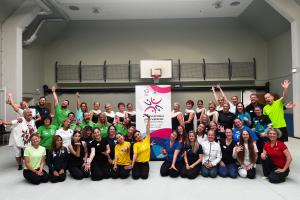This website uses cookies. By continuing to use our site you are agreeing to our use of cookies.
For more details about cookies and how to manage them see our privacy policy.
European Icons: Queen of the Beam Catalina Ponor
Holding the record of most European titles on a single apparatus, Romanian legend Catalina Ponor truly is an European icon. From her first win on beam at the 2004 European Championships in Amsterdam (NED) to her last win on home soil in Cluj-Napoca in 2017, Ponor inspired kids all over the world to take up gymnastics. Her journey started when she saw an interesting building in her hometown of Constanta, the now 37-year-old explains: “I was so curious to go there, so I just grabbed my grandma and I was like, oh, I want to go there in that building. Of course, my grandma knew what is inside. And when I open the door and saw all the people around, the kids, the apparatus. It was love at first sight. Simona Amanar was training in that gym, we are from the same club. I saw her how she was doing a lot of things and how she was flying around and all that. And I felt like, OK, from now on, I just want to do this and I want to do like her. I want to just fly. I was very, very stubborn. Around nine years old, my mum actually wanted me to stop gymnastics because I had a big accident. She told me I couldn’t go anymore. I told her ‘No, I'm just gonna run away.’”
Ponor credits her healthy stubbornness for a lot of her success. That, and hard work as she remembers fondly: “When I did the first steps in gymnastics, I felt that I really want to do only this. I don't want to try anything else. I was just so fascinated that I knew I'm not going to do anything else. This is for me and I want to do this and that's it! To be stubborn is good but you have to be stubborn on some points, not going in another direction. I know when to stop with this stubbornness. I combined this stubbornness that I had with ambition, and that was, I think, the best combination that I could have inside.”
Making her international debut in 2003, Ponor quickly rose to the top. Her most memorable moment came a year later, at the 2004 Olympic Games in the Greek capital Athens where she won three titles. Looking back, Ponor reflects with pride, “I wanted to [win] of course. I dreamed about that. Something showed me that I could do it because [the year before] I won three silver medals at the World Championships. Then I went to Amsterdam for the European Championships where I won three golds. And then day by day, I grew more hungry. I wanted more and more. Because of this feeling and because of what I did before something told me that, OK, you can do this. I know you can. You can have this medals of course. But it was way more than I expected. Because I just dreamed to be only Olympic Champion. That's it. But God gave me this three times!” Standing on the top of the podium not once, not twice but three times was emotional Ponor states: “To be honest, if you ask me right now and I wanted to remember every single feeling that I had in that moment, I cannot explain you because there are a lot of emotions, a lot of feelings. You cannot explain actually those feelings. It’s maybe fear somehow. With the ambitions to achieve what you worked for. The feeling that you're happy because you are there in the same time or the feeling to don't do mistakes because you know the team is in your hand and you can’t do mistakes. Maybe the gold medal may pass through next to you. And you cannot catch it. There are a lot of mixed feelings and I don't know if I can explain exactly what I was feeling in every single moment that I was there. Of course, a lot of excitement because not everyone goes to Olympics.”
Her calm and confident composure on beam earned her the accolade ‘Beam queen’. “I think it was talent first. Coach Mariana Bitang was telling everyone about me that if I wake up at 12:00 in the morning, I can just go on the beam and do the exercise. Exactly how you wanted to do it. And she was right. So this was a talent that I had. And I knew how to explore this talent and to put the icing on the cake. Then it was work. I was working so much, with so many repetitions, thousands, millions of repetitions on every single skill”, Ponor laughs, “Then, of course, listen to the coaches because they know how to put you on the right place, they know when you do mistakes. They know when it is good and you have to start feeling every single movement that you are doing, if you are and you pay attention to the coach, you by yourself start feeling your movement in the exercise and in the skills.”
Her competitive focus was noticed throughout the gymnastics community. Ponor thrived both in training and in competition. “First, I think it was the desire to achieve what I wanted to achieve. My highest aim was to be Olympic Champion, so to be Olympic Champion I needed to make some sacrifice. To have this desire and this hunger to compete. And when I was competing, it was something that I don't know how to explain. Something that I wanted to do forever. I was so happy to compete. I was so relaxed. The public and all the people were making me feel special. So being there in the arena in the middle of the competition with people wishing me to be the best, this makes me feel special. That's why it was something that pushed me to be all the time in the gym and train and to be focused on what I have to do because if you are not focused, if you are not spending the time in the gym and work and do a lot of exercises, you don't achieve what you dream. Focusing on what you have to do, focusing in the gym, focusing on your training.”
Ending their career on a high is what most athletes dream of. For Ponor, her farewell came in front of a home crowd at the 2017 European Championships in Cluj-Napoca. “I will put Athens first, of course. That is the most important moment in my career, but after that I will put European Championships in Cluj. Even if I had done so many Europeans before, and I had so many European golds. This one was feeling special. Because it was at home”, Ponor reflects. “Because I had a lot of Romanian people around me and cheering for us. Because for the first time I had my parents next to me. And because I felt that this will be the last one and I wanted to finish with my chin up because I had that disappointment in the Olympics in 2016. And I wanted to show everyone that that was a mistake. I had some disappointing moments in Cluj too because if you watch the Europeans in qualification I was with my first coach, from when I started in gymnastics. Then, in the finals, I was with another coach, a female coach. This was because Matei Stanei, my first coach, decided to quit just one day before. That's it. Among the emotions and all the frustration and all that just came over me like this. And when I saw that I won, it was just exploding and crying. And I was like, oh, finally, I did it.”
Now married and a mum, Ponor remains involved with the sport that made her famous. “I'm pretty busy with the kids, actually. In gymnastics, I'm going when I have to be with FIG, being the athletes’ representative. I'm trying to be at every meeting that we have and to explore this part a little bit. Then I want to be, and I try to be, all the time in the competitions to talk with the gymnasts if they have something they want, if we can change something in the future for them and be good for them. The rest of the days I'm home with my kids. Both of them are very little. I have to be all the time with them. But I still have two times per week class with little kids in a very small club. We are trying to explore the talent to go in gymnastics and achieve something. We are trying to help them, to encourage them. When I see a little kid that can do gymnastics and has this talent, I send them to the big clubs, Steaua or Dinamo.”
As European icon, what advice can Catalina Ponor share with the gymnasts about to compete in Leipzig (GER) at the 2025 European Championships in Artistic Gymnastics?
“They need to stay very focused on what they have to do and stay healthy first because they need to be healthy to achieve what they want. I'm pretty sure that every single one of them has a dream, so they need to try to put a scale and to step on every single step of the scale and going up. Even if it's hard. Even if they have problems. Maybe today they don’t want to do it anymore and tomorrow wants to do it. I know this feeling very well. They just need to stay focused on practicing, working a lot. And enjoying of course!. Enjoying every single training as much as they can. I think this is something very important because I was thinking that every training is a competition. So I have to push myself thinking that I'm every day in a competition and I want to win.”
Thank you Catalina!


